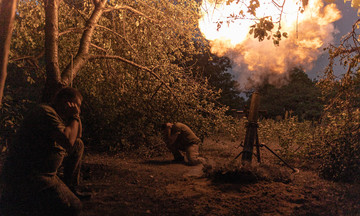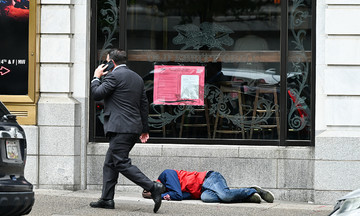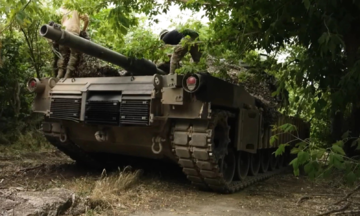Loud explosions echoed throughout Damascus on 16/7 as Israeli warplanes targeted buildings in the city center. The Syrian defense ministry and other military installations were hit.
"The message to Damascus has been delivered, now come the painful blows," Israeli Defense Minister Yoav Gallant declared. He pledged that the Israeli military would "operate forcefully" in Sweida, southern Syria, "to eliminate the forces that attacked the Druze until their complete withdrawal."
Footage broadcast on television showed bombs and missiles hitting the Syrian defense ministry, sending plumes of smoke into the air. According to a witness, Israel also struck a location near the Syrian presidential palace.
The extent of the damage from the Israeli strikes is not yet clear.
Smoke rises from the Syrian defense ministry headquarters in Damascus during the Israeli airstrike on 16/7. Video: Al Jazeera TV
Syrian government forces entered the southern city of Sweida, a predominantly Druze area, on 15/7, purportedly to oversee a ceasefire reached with Druze community leaders. The ceasefire followed clashes between the Druze and Bedouin communities that left over 100 people dead.
However, witnesses reported that government forces joined with Bedouin fighters in attacking Druze gunmen and civilians throughout the city.
The Israeli defense minister subsequently called on Damascus to "leave the Druze of Sweida in peace." "Israel will not abandon the Druze in Syria," he stated, demanding the withdrawal of Syrian forces.
Shortly after, the Israeli military announced the attack on Syrian military headquarters in Damascus.
 |
Location of Israel, Syria and Sweida province. Graphic: WP |
Location of Israel, Syria and Sweida province. Graphic: WP
The Bedouin and Druze communities in Sweida have a long-standing feud, with occasional outbreaks of violence. Fighting erupted on 13/7 after Bedouin gunmen kidnapped a Druze shopkeeper on the highway to Damascus, leading to retaliatory attacks. The hostages were later released, but fighting continued on the outskirts of Sweida on 14/7, with several villages targeted by mortar fire.
The Druze religion has similarities and historical connections to Islam, with a significant number of followers in Syria, Lebanon, and Israel. There are approximately 140,000 Druze in Israel, comprising about 2% of the population. Many Druze serve in the Israeli military, making them an influential minority group in the country's politics.
Tel Aviv affirms the Druze community's significant contribution to Israel's security, with many having died while serving in the Israeli military.
The Druze community in Israel has deep familial and historical ties with the community in Syria. Consequently, they often urge the Israeli government to protect their "brethren" in Syria, despite Tel Aviv having no formal alliance with the Druze community in its neighboring country. Israeli officials have previously warned of intervention to protect the Druze in Syria.
Huyen Le (Reuters, AFP)












